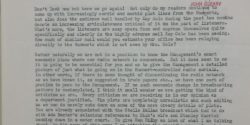Subscribe: Spotify | TuneIn | RSS | More
On this week’s show, we take a trip back in time to look at radio in the 1940s and 1950s. During this post-war period, women’s roles were shifting in the workplace and in popular media. Television arrived on the scene, bringing with it some, but not all, of the programming that people knew and loved from radio. Battles were also brewing over radio content, including violence, sex, and portrayals of family life. Our guest, scholar Catherine Martin, has been poring over FCC complaint letters from this period and explains what all the fuss was about. She is Visiting Assistant Professor in Media Studies in Denison University’s Department of Communication.
Show Notes:
- Catherine Martin’s article Eliminating “Blood and Thunder” from Containment Culture: Audience Efforts to Censor Postwar Radio Programming in the Run-up to Television (U.S. Studies Online)
- Radio Preservation Task Force, a project of the National Recording Preservation Board of the Library of Congress
- Jennifer Stoever’s book, The Sonic Color Line: Race and the Cultural Politics of Listening
- Podcast #132: Sounding Out on the Cultural Politics of Sound & Listening
- The Television Code: Regulating the Screen to Safeguard the Industry by Deborah Jaramillo
- Guiding Light is one of the longest running soap operas on radio and television, airing in some form from 1937 to 2009
- Mr. and Mrs. North radio show episodes on the Internet Archive
- The Adventures of the Thin Man
- Podcast #14: Matthew Lasar Chats about Mae West
- Should NBC Finally Apologize to Mae West?
- Radio Reader: Essays in the Cultural History of Radio
- Vocal Tracks: Performance and Sound Media
- DuMont Television Network
- Honey West was a television crime drama series that aired 1965-66
- Podcast #135 – Resurfacing Women’s Contributions in Podcasting History with guest Jennifer Wang
- Podcast #289 – Celebrating Women in Sound with guests Jennifer Wang and Jennifer Stoever
- Listening In: Radio and the American Imagination by Susan Douglas
- George RR Martin talks about censorship on TV in the 90’s
Image Credit: Stockton Helffrich, “Memo from Stockton Helffrich to John Cleary,” February 2, 1955, Folder 112; Box 349; National Broadcasting Company Records, 1921-1976, Wisconsin Historical Society.



